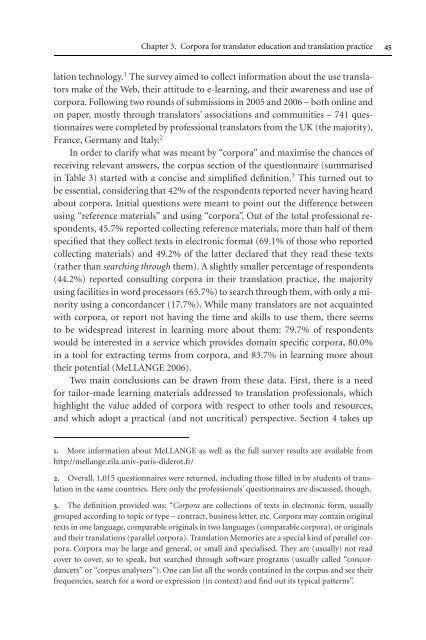Topics in Language Resources for Translation ... - ymerleksi - home
Topics in Language Resources for Translation ... - ymerleksi - home
Topics in Language Resources for Translation ... - ymerleksi - home
- No tags were found...
You also want an ePaper? Increase the reach of your titles
YUMPU automatically turns print PDFs into web optimized ePapers that Google loves.
Chapter 3. Corpora <strong>for</strong> translator education and translation practice 45lation technology. 1 The survey aimed to collect <strong>in</strong><strong>for</strong>mation about the use translatorsmake of the Web, their attitude to e-learn<strong>in</strong>g, and their awareness and use ofcorpora. Follow<strong>in</strong>g two rounds of submissions <strong>in</strong> 2005 and 2006 – both onl<strong>in</strong>e andon paper, mostly through translators’ associations and communities – 741 questionnaireswere completed by professional translators from the UK (the majority),France, Germany and Italy. 2In order to clarify what was meant by “corpora” and maximise the chances ofreceiv<strong>in</strong>g relevant answers, the corpus section of the questionnaire (summarised<strong>in</strong> Table 3) started with a concise and simplified def<strong>in</strong>ition. 3 This turned out tobe essential, consider<strong>in</strong>g that 42% of the respondents reported never hav<strong>in</strong>g heardabout corpora. Initial questions were meant to po<strong>in</strong>t out the difference betweenus<strong>in</strong>g “reference materials” and us<strong>in</strong>g “corpora”. Out of the total professional respondents,45.7% reported collect<strong>in</strong>g reference materials, more than half of themspecified that they collect texts <strong>in</strong> electronic <strong>for</strong>mat (69.1% of those who reportedcollect<strong>in</strong>g materials) and 49.2% of the latter declared that they read these texts(rather than search<strong>in</strong>g through them). A slightly smaller percentage of respondents(44.2%) reported consult<strong>in</strong>g corpora <strong>in</strong> their translation practice, the majorityus<strong>in</strong>g facilities <strong>in</strong> word processors (65.7%) to search through them, with only a m<strong>in</strong>orityus<strong>in</strong>g a concordancer (17.7%). While many translators are not acqua<strong>in</strong>tedwith corpora, or report not hav<strong>in</strong>g the time and skills to use them, there seemsto be widespread <strong>in</strong>terest <strong>in</strong> learn<strong>in</strong>g more about them: 79.7% of respondentswould be <strong>in</strong>terested <strong>in</strong> a service which provides doma<strong>in</strong> specific corpora, 80.0%<strong>in</strong> a tool <strong>for</strong> extract<strong>in</strong>g terms from corpora, and 83.7% <strong>in</strong> learn<strong>in</strong>g more abouttheir potential (MeLLANGE 2006).Two ma<strong>in</strong> conclusions can be drawn from these data. First, there is a need<strong>for</strong> tailor-made learn<strong>in</strong>g materials addressed to translation professionals, whichhighlight the value added of corpora with respect to other tools and resources,and which adopt a practical (and not uncritical) perspective. Section 4 takes up1. More <strong>in</strong><strong>for</strong>mation about MeLLANGE as well as the full survey results are available fromhttp://mellange.eila.univ-paris-diderot.fr/2. Overall, 1,015 questionnaires were returned, <strong>in</strong>clud<strong>in</strong>g those filled <strong>in</strong> by students of translation<strong>in</strong> the same countries. Here only the professionals’ questionnaires are discussed, though.3. The def<strong>in</strong>ition provided was: “Corpora are collections of texts <strong>in</strong> electronic <strong>for</strong>m, usuallygrouped accord<strong>in</strong>g to topic or type – contract, bus<strong>in</strong>ess letter, etc. Corpora may conta<strong>in</strong> orig<strong>in</strong>altexts <strong>in</strong> one language, comparable orig<strong>in</strong>als <strong>in</strong> two languages (comparable corpora), or orig<strong>in</strong>alsand their translations (parallel corpora). <strong>Translation</strong> Memories are a special k<strong>in</strong>d of parallel corpora.Corpora may be large and general, or small and specialised. They are (usually) not readcover to cover, so to speak, but searched through software programs (usually called “concordancers”or “corpus analysers”). One can list all the words conta<strong>in</strong>ed <strong>in</strong> the corpus and see theirfrequencies, search <strong>for</strong> a word or expression (<strong>in</strong> context) and f<strong>in</strong>d out its typical patterns”.
















